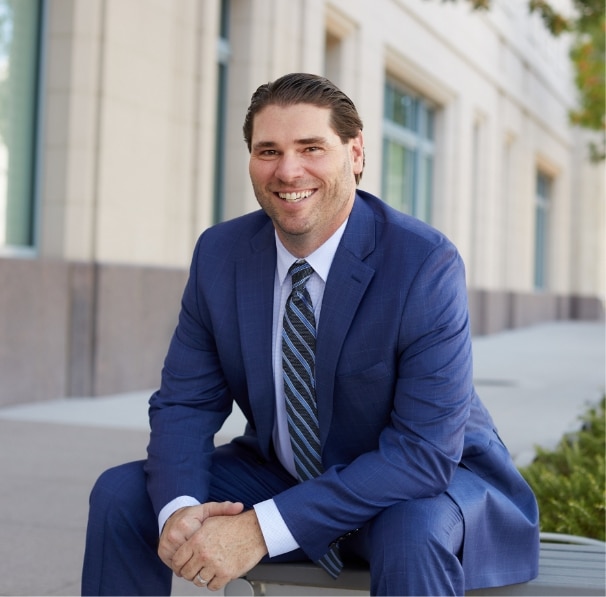If you suffered injuries in a slip and fall accident in Las Vegas, you may be entitled to compensation for non-economic damages, like pain and suffering, in addition to economic damages. Determining the value of your non-economic damages is not as simple as adding up your receipts, billing statements, and other financial costs. How is pain and suffering calculated in a slip and fall lawsuit?
Table of Contents
Toggle
Determining the Value of a Slip and Fall Lawsuit
Various factors will be considered when determining the value of a Nevada slip and fall lawsuit. Although no injury lawyer can guarantee how much you will recover, an experienced premises liability attorney can provide you with a fairly accurate estimate of what to expect. Your lawyer will consider:
- The severity of your injuries and how they impact your life
- Your economic losses
- Your non-economic losses
- The insurance coverage or other sources of financial recovery available
What Are Damages?
The term “damages” in a slip and fall accident case refers to the money you are allowed to recover from the defendant if you can prove that the party’s negligence caused your injuries. These are determined by the total of the allowable losses you incurred because of the incident.
There are generally two kinds of damages in an accident case: special and general damages. In rare cases, punitive damages may be available as well. Special damages encompass all the economic costs resulting from the injury. General damages refers to your intangible losses.
Special Damages in a Slip and Fall Lawsuit
Special damages are the monetary damages that plaintiffs may recover in a case. They might include lost income because the injury caused the victim to miss work. Also known as “economic damages”, your special damages might also include medical bills, a loss of earning capacity, and other ancillary losses.
Knowing what to do after a slip and fall accident can help ensure all of your economic losses are accounted for. Be sure to document everything. Keep those receipts, bills, and earnings statements.
Medical Bills
In addition to the emotional and physical toll of the accident, medical bills often have a seismic impact on the value of a slip and fall lawsuit. When calculating your compensable medical bills, your attorney will consider the cost of your emergency room treatment, hospital stays, doctor and specialist visits, surgeries, and treatments. You will also be able to include the amount you spend on special medical equipment, prescription medications, rehabilitation, and in-home nursing care.
Lost Wages
There are several reasons why people may miss work because of a slip and fall injury. Victims may need to go to doctor’s appointments during working hours. Some may miss weeks, months, or even years of working if the injury makes it impossible for them to perform job duties. Others may lose out on wages because their injuries force them to take reduced hours or inhibit them from working overtime or special, higher paying projects.
Loss of Earning Capacity
Some injuries leave people so immobile or in so much pain that every-day activities become difficult or impossible for them. People who can no longer continue with their chosen career path because of an injury may have the opportunity to collect damages for loss of earning capacity.
To prove lost earning capacity, your slip and fall lawyer may call on a vocational rehabilitation specialist. The specialist will provide his or her expert opinion on how your injuries impact your ability to perform full time work that pays the same as your pre-accident wages. If your case is successful, you may receive money to pay for training or education in a different field. You may also be awarded a sum of money to offset the lost earning capacity.
Incidental Expenses
Incidental expenses include the other costs you incurred because of your slip and fall accident. You may be able to receive compensation for the fuel you had to buy to make it to your doctor’s appointments, the parking you had to pay for, or even your lodging expenses, so you could be close to your medical team or the courthouse.
General Damages in a Slip and Fall Accident Case
General damages is a term commonly used to describe intangible damages. Since these types of damages are subjective, and not tied to a monetary value, they are usually more difficult to calculate. People who sue for general damages may work with a Las Vegas personal injury lawyer to recover compensation for things like pain and suffering, anxiety, stress, and emotional distress linked to the accident.
What Is Pain and Suffering in a Slip and Fall Accident Case?
In a slip and fall accident lawsuit, pain and suffering is generally the most difficult component to calculate. Pain and suffering refers to the non-monetary damages that a person suffers because of an injury. Pain and suffering applies to a wide range of physical and emotional ailments that can disrupt a person’s life. Victims may be able to recover compensation for pain and suffering if they struggle with pain from their wounds, the emotional trauma of witnessing violence, and the embarrassment from their physical maladies.
How Is Pain and Suffering Calculated in a Slip and Fall Lawsuit?
There is no solitary rule for calculating pain and suffering in a slip and fall lawsuit. Generally, the courts will rely on one of two methods to calculate pain and suffering – the multiplier method or the per diem method.
The Multiplier Method
The most often-used method for determining pain and suffering in a slip and fall lawsuit is the multiplier method. First, your lawyer will calculate your special damages, or those incurred from monetary expenses, like medical bills and lost wages. The attorney will multiply that sum by 1.4, four, or five. The outcome of that equation will give you an estimate of the slip and fall damages you may recover. The number chosen depends on several factors, including the following:
- The plaintiff’s prospects for a quick recovery from his injury
- The overall seriousness of her injuries
- Whether the defendant is obviously at fault
- The degree to which the injury impacts their day-to-day lives
Generally, the more severe the case, the higher the number used for the multiplier equation. The main point of the settlement negotiations then becomes which multiplier to use for the calculations. The plaintiff’s attorney, will argue that the severity of the incident calls for a higher number, and the defendant will generally argue for a lower number.
A Daily Rate
The second most popular way to calculate pain and suffering is to use the “per diem” approach. Per diem is a Latin word meaning per day. This calculation method asks for a dollar amount for every day a person lives with the pain and suffering caused by an accident.
For instance, a woman breaks her leg in a library because the floor breaks under her. She could hire a Las Vegas premises liability lawyer to sue that library. If the plaintiff and her lawyer were to use the per diem method for calculating damages, they would add up the total number of days she experienced discomfort and pain as a result of the accident. Maybe she was hurt so seriously that she suffered from pain for seven months, or about 210 days.
The woman in this example earns $45,000 a year, which equates to $200 a day when you divide the salary by the 250 working days that a person typically performs in a given year. To calculate the pain and suffering in the case, she would multiply $200 by the 210 days that she experienced pain. Her lawyer may then argue that the resulting $42,000 is a reasonable calculation for the victim’s suffering.
The per diem method does not work as well when a person must calculate long-term or permanent injuries. Lawyers have different methods for calculating the pain and suffering inherent to those situations.
How Comparative Negligence Impacts the Value of Your Slip and Fall Lawsuit
If the property owner or manager is determined to be at fault for your slip and fall, be prepared for the defense to argue that you bear some of the responsibility for the accident. This is a common tactic used by insurance companies to minimize or eliminate payouts on slip and fall claims. Their attorneys might claim that:
- The dangerous property condition that caused your fall was made obvious to you with signage or warnings.
- You were distracted while walking (looking at your phone, for instance).
- You were not supposed to be in the area where your accident occurred.
Even if you are determined to have been partially at fault for your injuries, you may still be able to recover compensation.
Nevada uses the “comparative negligence” rule when determining whether, or how much, you can recover for your losses. If the defendant uses your alleged role in the accident as a defense, and you are determined to have been more than 50% at fault for the slip and fall accident, you cannot recover damages. If your share of liability is 50% or less, however, you can still sue the property owner, manager, or another party to recover compensation. Your award will be reduced by your portion of fault.
For example, let’s say that you are determined to have been 30% at fault for the incident, and the jury calculates your economic and pain and suffering damages at $10,000. The jury will subtract 30% ($3,000) from your total damages, leaving the defendant on the hook for the remaining $7,000.
How To Provide Evidence of Pain and Suffering
Documenting evidence of your pain and suffering is crucial when filing a lawsuit for a slip and fall. Communicating your discomfort with your healthcare professionals is only the beginning. Evidence to support your claim might include:
- The testimony of medical experts
- Your medical records
- Photographs and videos of your injuries
- Personal documentation of the pain and suffering you experience daily
- Witness statements
Demonstrating how your injuries have had a negative impact on your life is key to winning compensation in your slip and fall lawsuit. Be sure to emphasize how your discomfort affects your mobility, your ability to focus, the medications you are now required to take, and your ability to enjoy life. If you suffer depression, anxiety, fear, or PTSD because of your slip and fall, make sure your mental health conditions are documented as well.
Hiring an Injury Attorney Can Increase Your Slip and Fall Settlement Amount
Insurance companies often try to discourage injured victims from hiring a slip and fall accident attorney, but handling your case on your own is not recommended. Without an injury lawyer on your side, you could easily make mistakes that jeopardize your claim. Additionally, studies show that victims who hire injury attorneys recover up to three times more than those who handle their cases on their own. Here’s why:
- Without an attorney to guide you, you may answer questions or make statements that devalue your injury claim.
- Insurance companies are known for lowballing victims. If you don’t have an experienced lawyer negotiating on your behalf, you could settle your claim for far less than what it’s worth.
- Premises liability laws in Nevada govern who may be held liable for injuries. If you aren’t familiar with those laws and fail to identify possible defendants in your case, you could miss out on sources of compensation.
- You may be forced to go up against an experienced team of attorneys on your own in the courtroom.
Your attorney can guide you through the legal system and help you understand and overcome complications that arise in your case. He or she will be able to answer your questions, like “How is pain and suffering calculated in a slip and fall lawsuit” or “How much is my slip and fall claim worth?”




